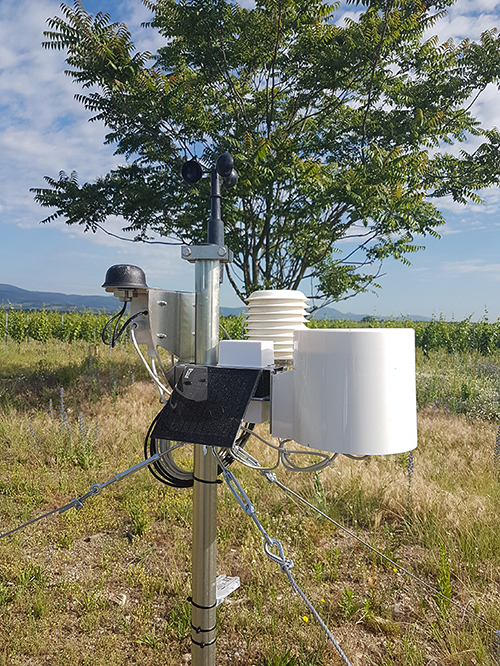
Inventing the winemaking of tomorrow
At Wolfberger, we have always altered our planting practices in favour of a healthier, more sustainable viticulture, by experimenting with all sorts of possible solutions with the knowledge available.

Human and Science serving sustainable winemaking
At Wolfberger, we have always altered our planting practices in favour of a healthier, more sustainable viticulture, by experimenting with all sorts of possible solutions with the knowledge available.
One of the largest producers of organic wine in Alsace for more than 15 years, Wolfberger has had the benefit of long experience in the subject. In fact, creating Organic wines was an amazing laboratory of alternative growing practices. It allowed us to question certain practices and to encourage a new awareness. Nevertheless, it is clear that Organic production also has its limits in terms of environmental protection, and that we need to go beyond this approach.

Wolfberger had already anticipated the need to change our methods of conventional winemaking. The Winery was certified by AgriConfiance nearly 10 years ago. AgriConfiance is a contract of reciprocal commitment between the Winery and its members. All our winegrowers receive an individual statement concerning their growing practices and targeted action plans, along with regular training sessions in small groups that allow us to deepen our knowledge of the vines and to promote alternative growing methods, such as detecting wood diseases, lowering the doses of agrichemicals, treating the vines with plants, even resorting to insect sexual confusion [1]. The result is that in five years Wolfberger has already managed to decrease its use of agrichemicals by 25%. Wolfberger opts for reliable solutions with irrefutable benchmarks.
More than ever a proactive pioneer, Wolfberger today is spearheading a third path towards sustainable growth, one that rests on rigorous technical choices, freeing us from accepted notions, common beliefs and esoteric practices with no scientific foundation.

Concerning technological innovations, we have invested in sophisticated weather stations that give us optimum control of our parcels and reduction of agrichemical doses.
During the season, this reduction can reach nearly 60% when coupled with extremely precise watering techniques. These methods are a perfect match to the surgical approach of our work. In order to find an alternative to chemical weed control, we are exploring newly existing avenues of weed control under the rows of vines. These undergo studies and then experiments with different mechanical tools, guided by tractors or delivered with autonomous high-clearance robots, as well as different weed control solutions using electricity and hot water.
Agronomic advances alongside digital and robotic evolution: we are developing the use of plant-based biocontrol agents[2] that stimulate the plants’ natural defence systems (extracts of fruit pectin and chitosan, from the carapace of shellfish). We prefer to care for and maintain the fertility of our soils by using plants, developing the principle of crop canopy or cover (3), inspired by the practices of conservation agriculture. Proof of our success in these practices – our Riesling Grand Cru Muenchberg 2017 was awarded “Trophée du Meilleur Vin Sec du Monde”, or World’s Best Dry Wine, among the gold medals at the 2019 Concours des Grands Vins Blancs du Monde.
At the same time, we are researching the cultivation of new varietals that are impervious to different kinds of mildew, Floréal and Voltis. The result of traditional crossbreeding without genetic mutations, they allow us to reduce the frequency of treatment procedures by 85%. The goal is to see the quality of these tough varietals in the Alsace terroir, as measured by INRA (National Institute of Agronomic Research), and their resistance to climate change. But a scientific approach serving sustainable winemaking also includes preserving the genetic heritage of our plants. Our long-term vision is to invest in creating a large ampelographic conservatory (the biggest in Alsace today) at our winery in Colmar, in order to preserve and keep in reserve the genetic diversity of our members’ oldest and most beautiful parcels. This botanical conservatory is an extra treasure chest for assuring the quality of our future plantations and planning for the future of the Appelation.

We are moving forward, thoughtfully and meticulously, in how to know and better plan for the future. Our proactive policies favouring the environment have been guided for more than ten years by scientific choices that are at the same time progressive, evolutionary, economically viable and open to progress.
Hervé Schwendenmann, President of Wolfberger
Bertrand Dufour, General Director of Wolfberger
[1]Insect Sexual Confusion: an alternative to using chemical insecticides, this method uses sexual pheromones diffused over a parcel, making it less attractive for insects because the males can no longer find females.
[2] Biocontrol agents: methods for protecting plants, relying on living organisms or natural substances following four approaches, all based on macro-organisms (insects, nematodes, etc.) or micro-organisms (viruses, bacteria or moulds), chemical mediators (pheromones) or other natural substances, mineral, plant or animal.
[3] Plant canopy or cover: refers to successive layers of plants and plant detritus that protect the soil from erosion, high temperatures and evaporation. The plant cover protects the surface soil, providing organic matter and restructuring the earth with their roots. They also play an important role in managing the cleanliness of water, without counting the possibilities of atmospheric nitrogen attaching to the subsequent crop. Covering the soil means more autonomy for the winegrower and consequently less interference, be it mechanical or agrichemical and fertilizers.


